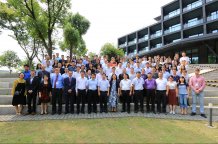Articles

ESSPRIT Workshop Attendees
Successful public engagement and capacity building activity in Suzhou, China
The Centre for Water Systems (CWS), University of Exeter, and the School of Environment (SOE), Tsinghua University, organised the ESSPRIT (Embedding Spongy Strategic Planning In flood Resilient cities) Capacity Building Workshop in Suzhou, China, during 20th and 24th August 2018.
The workshop is a part of the ESPRIT (Embedding Strategic Planning In flood Resilient cities) project, funded by the UK Royal Academy of Engineering. The ESPRIT project, led by Dr Albert Chen at CWS and Prof Haifeng Jia at SOE, aims to tackle the challenges in urban flood management and resilience enhancement via joint research between the UK and China.
The ESSPRIT workshop was supported by the Office of Spongy City Development of Suzhou City and Suzhou University of Technology. Over 100 delegates, including directors and officers of the Resident and Construction Office of Jiangsu Province, Suzhou Municipal Resident and Construction Bureau, Urban Planning Bureau, Water Bureau, Garden Management Bureau, China Academy of Urban Planning and Design, Beijing Municipal Institute of City Planning and Design, Shanghai Municipal Engineering Design Institute, and practitioners from local consulting companies participated in the workshop. It received significant attention form the media in Suzhou and nearby areas. The Suzhou TV channel interviewed the experts and broadcasted the news regarding the workshop.
The ESSPRIT workshop focused on the integration of urban flood management and spongy city adaptation strategies. Academics, undergraduate and postgraduate students from University of Exeter, Tsinghua University, Peking University, Dalian University of Technology, and Xi’an University of Technology shared state-of-the-art research in urban flood management and experiences in over 10 case studies.
The CWS members (Dr Albert Chen, Prof Guangtao Fu, Dr Barry Evans, and Dr Mike Gibson) presented the key outcomes from the previous and ongoing projects, including:
- Coupled 1D sewer/2D overland flow modelling developed in the EPSRC FRMRC Phase 1&2 projects;
- Climate change and extreme weather impact to communities from the EPSRC CREW/WERVE projects;
- Cellular automaton based high performance flood model in the EPSRC CADDIES project;
- Visualisation techniques from the EPSRC Serious Gaming and the EU H2020 SIM4NEXUS projects;
- Flash flood modelling and real-time end-to-end flood forecasting modelling approach established the SINATRA/TENDERLY projects, a part of the NERC FFIR programme;
- Flood modelling in mega cities from the Global Innovation Initiative project funded by British Council;
- Flood impact and resilience assessment approach from EU FP7 CORFU and PEARL projects;
- Natural hazard impact to critical infrastructure and the cascading effects under climate change scenarios in the EU H2020 EU-CIRCLE project; and
- Interconnectivities among various urban services and resilience assessment from the EU H2020 RESCCUE project.
The cloud version of the CADDIES flood model was developed particularly for the workshop and its applications were also demonstrated. Dr James Franklin from Sweco and Mr Remi Dornier from Dassault Systems also shared the innovative methodologies currently being used and developed by global companies.
Date: 4 September 2018
